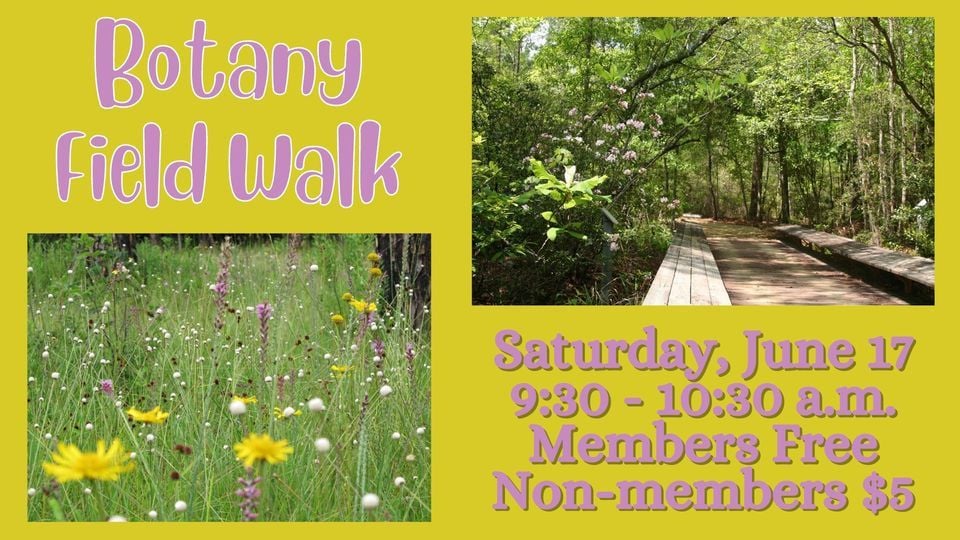Arboretum Paths: Exploring nature at the Arboretum
Published 7:00 am Wednesday, April 13, 2016

A gentle yoga class, led by certified instructor James Sones, will take place this Saturday on the Pinecote Pavilion (Photo by Pat Drackett).
To celebrate this beautiful spring weather, a variety of activities will take place this weekend at the Arboretum to allow visitors to get the most out of their time spent immersed in the natural world. Take a wildflower field walk and see what’s blooming in the Savanna Exhibit, learn about frogs and toads found in our area, or participate in a gentle yoga class in the lovely outdoor setting of the Pinecote Pavilion.
Nature discovery and exploration is a consistent theme that serves to tie together many of the programs and events offered at the Crosby Arboretum. In addition to exploring native plants during several scheduled field walks, programs this spring include Mississippi wildlife such as butterflies and moths, snakes, and native pollinators.
Much of my time lately has been spent assembling lists of plant material we will be ordering for our spring plant sale on April 22 and 23. We’ve already received several species of native milkweed (A. perennis, A. incarnata, and A. tuberosa), and were pleased to find a nursery that grows pesticide-free milkweed plants. While magazine articles and other media sources urge gardeners to plant their native milkweed species rather than tropical varieties, native milkweeds are not easy to locate.
Because milkweed can attract other insects such as aphids, plants are often treated with pesticides at nurseries where they are grown.
Systemic pesticides are internalized in the plant, and can last up to 12 months. Purchasing from garden centers having a close relationship with their growers and knowing their practices is key if your intent is to attract monarch butterflies to lay their eggs on your milkweed. It’s a sad experience indeed to find your caterpillars dying after ingesting treated milkweed.
It takes approximately three plants to raise a monarch caterpillar through its five developmental stages before it forms a chrysalis and awaits transformation into a butterfly. Since monarch butterflies can lay several hundred eggs, gardeners often find themselves running out of milkweed and developing the urgent need to obtain more. The solution? Plant lots and lots of milkweed!
Native milkweed seed is available through Internet sources (and the Arboretum gift shop). Remember that native milkweed seed requires a cold stratification period (time spent in your refrigerator for at least 3 to 4 weeks).
Important milkweed species for our coastal area include green antelope horn milkweed (Asclepias viridis), butterfly weed, (Asclepias tuberosa), and swamp milkweed, (Asclepias incarnata). The first two species prefer dry, gravely soils, have deep taproots, and are sensitive to transplanting.
However, swamp milkweed has fibrous roots and grows well in regular garden soil, contrary to its name. It is available in many color selections. According to one nursery owner, swamp milkweed’s leaf size and ease of cultivation makes it an excellent choice to plant in place of the non-native and potentially invasive tropical milkweed commonly available in garden centers.
Love monarch butterflies? Mark your calendars for a program on the “Amazing Life Cycle of the Monarch Butterfly,” on Saturday, April 30, from 10 to 11 a.m., with nature photographer and butterfly enthusiast Gregory Nordstrom and wife Becky, who raise monarch butterflies and enjoy sharing their passion with others. Children will delight in observing the fascinating process as a monarch caterpillar forms a chrysalis, transforms, and begins its life anew as a butterfly in the mesmerizing slide and video presentation.
On Saturday, April 16, at 10:00 a.m., Dr. Eddie Smith will present “Frogs and Toads of South Mississippi” (suitable for ages 5 and up).
Learn fun facts about the species of frogs and toads found in our coastal area, how they are different, and how to tell them apart. At 1:00 p.m., I will lead a spring wildflower field walk. Also at 1:00 p.m. a gentle yoga class led by certified instructor, James Sones, will take place in the beautiful natural setting of Pinecote Pavilion. Yoga mats will be provided, but you are welcome to bring your own. Please arrive at least 10 minutes early.
For more information, see our program calendar at www.crosbyarboretum.msstate. Call 601-799-2311 to sign up for either program. Cost is $5 for non-members and $2 for non-members’ children. The Arboretum is openWednesday through Sunday from 9 a.m. to 5 p.m. and located in Picayune, off I-59 Exit 4, at 370 Ridge Road (south of Walmart and adjacent to I-59).
Patricia R. Drackett, Director and Assistant Extension Professor of Landscape Architecture
The Crosby Arboretum, Mississippi State University Extension Service





